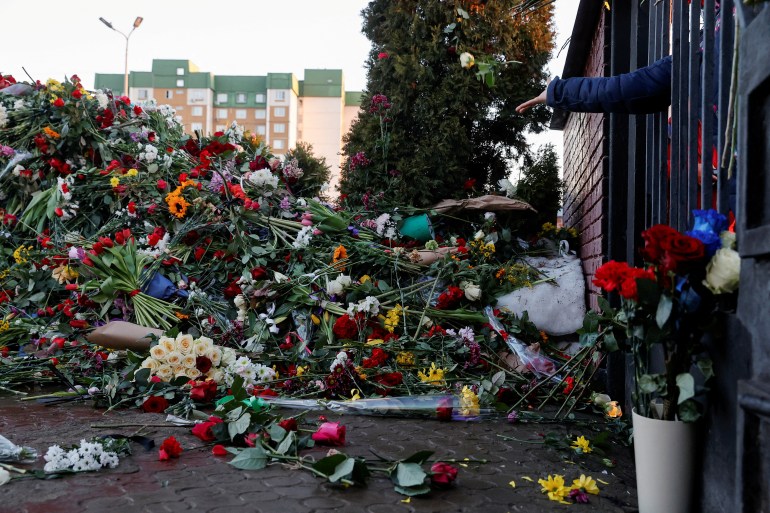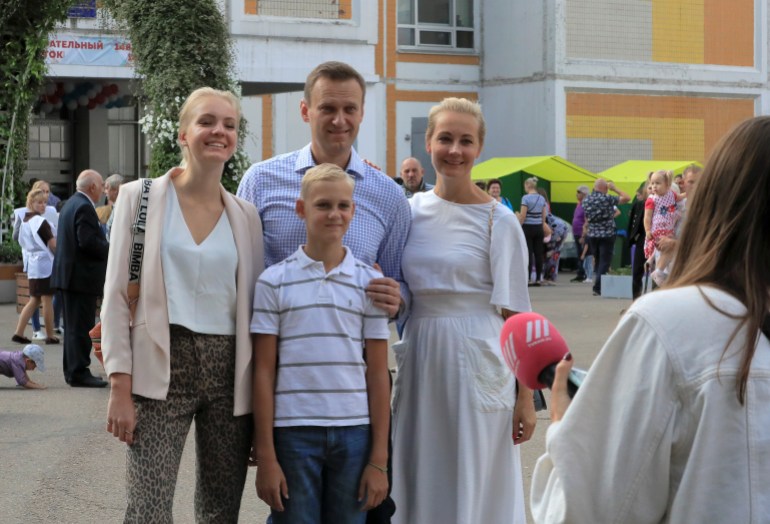Two days before his death, Alexey Navalny penned a valentine dedicated to his wife and muse Yulia.
“Baby, we’re like in the song [Hope] – between us, ‘There are cities, takeoff lights of airports, blue blizzards and thousands of kilometres,'” he wrote on February 14, St Valentine’s Day.
“But I feel you near me every second, and I love you more and more,” he wrote next to a photo of him and Yulia Navalnaya, 47, a tall, blonde ex-bank teller he met in 1998 during a vacation in Turkey.
Two days after what turned out to be his last social media post, Navalny, also 47, collapsed and died in what his widow and supporters believe was a Kremlin-orchestrated political murder.
Navalnaya pledged to take over her husband’s role as head of the Fund to Fight Corruption, an organisation that once sprawled throughout Russia, released muckraking corruption exposes and organised huge rallies.
The Kremlin banned it as “extremist”, disbanded it, persecuted dozens of its staffers – some were sentenced to up to nine years in jail – and forced many others out of Russia.
Navalny’s death and President Vladimir Putin’s widely expected re-election in a March vote may signal an even tougher crackdown on any sign of dissent or criticism of the war in Ukraine.
But opposition figures and analysts say that to become the undisputed head of Russian opposition in exile, Navalnaya would have to overcome deep disagreements among fractured and disunited groups that often criticised her husband.
 A person throws flowers towards the grave of Russian opposition politician Alexey Navalny while standing in front of a closed entrance to the Borisovskoye cemetery, in Moscow, Russia, March 3, 2024 [Reuters]
A person throws flowers towards the grave of Russian opposition politician Alexey Navalny while standing in front of a closed entrance to the Borisovskoye cemetery, in Moscow, Russia, March 3, 2024 [Reuters]
Just hours after the news of her husband’s death reached her, Navalnaya spoke at a security conference in Germany’s Munich – and did not sound like a vulnerable grieving widow.
Clad in a navy blue suit, with her hair pulled back and face convulsed with pain, she did not shed a tear – she sounded more like a Valkyrie pledging revenge.
“I want Putin, his coterie, all of his friends [and] his government to know that they will bear responsibility for what they’ve done with our country, my family and husband. And this day will come soon,” Navalnaya said – and received a standing ovation.
Three days later, she promised to “continue” Navalny’s work.
“I urge you to share my fury. My fury, my anger, my hatred of those who dared to murder our future,” she said in a video that has been viewed more than five million times on YouTube.
Her late husband’s associates are confident she can become his perfect successor, and that she would also help fill a gender gap in anti-Kremlin activism.
“Will she have enough resources to continue? She’s got more strength than many of us. Will she be a successful politician? Russia has long needed a creative female image in politics, and there’s only going to be more demand for it,” said Aleksander Zykov, who headed a Fund to Fight Corruption branch in the western city of Kostroma before fleeing for the Netherlands.
“That’s why yes, I believe in Yulia Navalnaya,” he told Al Jazeera.
She has big shoes to fill and needs to walk a tightrope to unite people from other opposition groups that work in exile or clandestinely operate in Russia.
Navalny’s work paved the way by organising some of the largest protest rallies in Russia’s post-Soviet history, creating an online “machine of truth” to file complaints about bureaucratic hurdles, potholed roads and leaking roofs, and creating an app to vote for anti-Kremlin politicians.
“Navalny’s team created a wider opposition movement that wasn’t tied to the Fund to Fight Corruption or other groups,” said Sergey Biziyukin, an opposition activist who fled the western Russian city of Ryazan.
“It was rather different from other parties, funds and organisations that made the opposition movement a noble, but hard-to-get-into crowd,” he told Al Jazeera.
“If Navalnaya and her team can do the same, it will be beneficial,” he said.
Alexey and Yulia got married in 2000, when Putin was first elected president.
 Pictured in 2019, Russian opposition leader Alexey Navalny, his wife Yulia, daughter Daria and son Zakhar pose for a picture outside a polling station during the Moscow city parliament election in Moscow, Russia [Tatyana Makeyeva/Reuters]
Pictured in 2019, Russian opposition leader Alexey Navalny, his wife Yulia, daughter Daria and son Zakhar pose for a picture outside a polling station during the Moscow city parliament election in Moscow, Russia [Tatyana Makeyeva/Reuters]
Both joined Yabloko (apple in Russian), Russia’s oldest liberal democratic party that had a presence in the State Duma, Russia’s lower house of parliament.
But Navalnaya preferred to focus on their children, Daria and Zakhar, and barely took part in her husband’s work.
Meanwhile, he was not happy about Yabloko’s complacency and cautiousness towards Putin’s increasingly hardline policies.
In 2007, when Putin’s second term was coming to an end, Navalny was kicked out of Yabloko for taking part in the Russian March, an annual rally of far-right nationalists, monarchists and white supremacists.
Navalny also co-founded the National Russian Liberation Movement, a nationalist group, with novelist Zakhar Prilepin who would later fight for Ukrainian separatists and co-chair a pro-Kremlin socialist party.
Many Russian liberal democrats cannot forget and forgive Navalny’s nationalism and derogatory remarks about Muslims, whom he once called “cockroaches”.
“When he told me that the future in Russia belongs only to the nationalist Russian political process, I said, ‘Okay, lad, we are not talking any more’,” Lev Ponomaryov, who heads the Moscow-based For Human Rights group and is blacklisted by the Kremlin as a “foreign agent”, told Al Jazeera in 2021.
Navalny toned down his stance to focus on online and video reports exposing corruption in the Kremlin, but never denounced his nationalist statements.
He started the Fund to Fight Corruption whose offices mushroomed throughout Russia.
But Navalny’s supporters are often rigid in accepting other Kremlin critics’ opinions.
The people Navalnaya will have to work with “are pretty authoritarian guys”, said Boris Bondarev, a veteran Russian diplomat to the United Nations office in Switzerland who quit after Moscow began the full-scale invasion of Ukraine in 2022.
“They claim to the be main force of the Russian opposition, and everyone else has to bend over,” he told Al Jazeera.
Navalnaya “will have to draw a fine, delicate line. To say, ‘Let’s unite around the memory of Alexey Navalny, but not under Navalny’s team, somehow around it, so that everyone contributes and we will all be equal,” he said.
However, Navalnaya’s current publicity could contribute to an infusion of hefty Western donations that may attract other opposition leaders and activists.
So far, Navalnaya’s biggest demand is pretty hard-hitting – she urged the West not to recognise the upcoming presidential vote in Russia.
And she is already gaining considerable support.
On February 19, she briefly met with US President Joe Biden, who promised “major new sanctions” against Putin.
On the next day, the White House announced more than 500 sanctions targeting individuals and companies that contribute to the war effort in Ukraine.
∎
